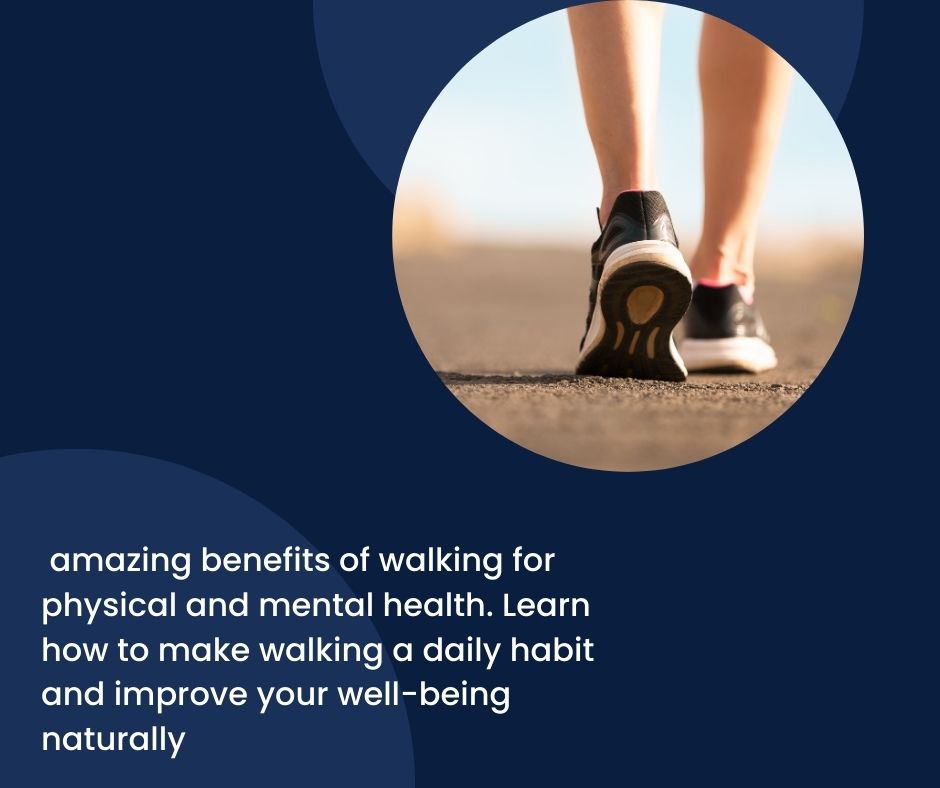The Benefits of Walking for Physical and Mental Health

Walking is one of the simplest yet most effective forms of exercise. It requires no special equipment, can be done almost anywhere, and offers numerous benefits for both your body and mind. In this article, we’ll explore why walking is so beneficial, how to incorporate it into your daily routine, and answer some frequently asked questions about this accessible form of exercise.
Why Walking Is Good for You
Walking is often underestimated, but its impact on physical and mental health is profound. Here’s why you should consider making walking a regular part of your day:
Improves Cardiovascular Health
Regular walking strengthens your heart, improves circulation, and reduces the risk of heart disease and stroke. Even a 30-minute walk at a moderate pace can lower blood pressure and cholesterol levels.
Boosts Mental Well-Being
Walking outdoors, especially in nature, has been shown to reduce stress, anxiety, and depression. The combination of physical activity and fresh air stimulates the release of endorphins, which are natural mood enhancers.
Supports Weight Management
Walking burns calories and helps maintain a healthy weight. While it may not burn as many calories as high-intensity workouts, consistency is key—walking daily can lead to gradual weight loss or maintenance.
Strengthens Muscles and Bones
Walking engages multiple muscle groups and promotes bone density, reducing the risk of osteoporosis and fractures as you age.
Enhances Cognitive Function
Studies suggest that walking improves memory, creativity, and problem-solving skills. A brisk walk can clear your mind and boost focus, making it an excellent activity before work or study sessions.
How Much Should You Walk Daily?
The Centers for Disease Control and Prevention (CDC) recommends at least 150 minutes of moderate-intensity aerobic activity per week , which translates to about 30 minutes of walking five days a week. However, even shorter walks can be beneficial if done consistently.
For those looking to increase intensity:
Add hills or inclines to your route.
Increase your pace to a brisk walk.
Incorporate intervals of faster walking followed by slower recovery periods.
Tips to Make Walking a Habit
Building a walking habit doesn’t have to be complicated. Here are some practical tips:
Set Realistic Goals : Start with 10–15 minutes a day and gradually increase your time.
Find a Walking Buddy : Having someone to walk with can make the experience more enjoyable and keep you accountable.
Track Your Progress : Use a pedometer or fitness app to monitor your steps and celebrate milestones.
Explore New Routes : Keep things interesting by trying different parks, trails, or neighborhoods.
Walk During Breaks : If you’re busy, take short walks during lunch breaks or after dinner.
Frequently Asked Questions About Walking
- How many steps should I aim for each day?
While 10,000 steps per day is a popular goal, it’s not a one-size-fits-all number. For beginners, aim for 5,000–7,000 steps and gradually increase as you build endurance. - Can walking help me lose weight?
Yes, walking burns calories and can contribute to weight loss when combined with a balanced diet. Consistency is key—walking every day, even for short durations, adds up over time. - Is walking enough exercise for overall fitness?
Walking is an excellent low-impact exercise, but combining it with strength training and flexibility exercises ensures a well-rounded fitness routine. - What’s the best time of day to walk?
The best time depends on your schedule and preferences. Morning walks can energize you for the day, while evening walks may help you unwind. Choose what works best for you. - Do I need special shoes for walking?
Comfortable, supportive shoes are important to prevent blisters and injuries. Look for sneakers designed for walking with cushioned soles and good arch support. - Can walking improve sleep quality?
Absolutely! Walking reduces stress and promotes relaxation, which can help you fall asleep faster and enjoy deeper rest.
Final Thoughts
Walking is a simple, accessible, and highly effective way to improve your physical and mental health. Whether you’re aiming to boost your fitness, manage stress, or simply spend more time outdoors, incorporating regular walks into your routine can make a significant difference. Start small, stay consistent, and enjoy the journey toward better health.
Disclaimer
This article is for informational purposes only and does not constitute medical advice. healthcare professional before starting any new exercise or program


